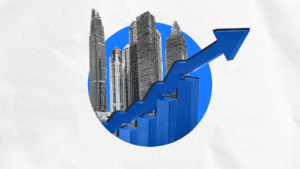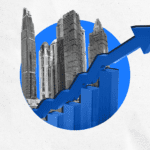The concept of wealth inequality has been thoroughly explored in the blog “The Truth About Wealth Inequality.” Within that blog, we conveyed that 1% of the rich in the world have owned 45% of global wealth. However, recent situations and changing circumstances have proved that 1% of rich are constantly garnering more wealth, with the middle class slowly disappearing.
Reading the last sentence of the paragraph above may or may not have made you slightly nervous. If anything, this is not the time to be nervous, but rather, the time to be understanding and making informed decisions. Coming out of the other side of this in a positive manner can seem daunting as the surrounding circumstances are quite uncertain, but it is not impossible! In retrospect, fair wealth inequality would mean that we get paid in terms of the value that we are able to provide. For instance, a doctor or engineer would be paid more in exchange for their specialized services, since it takes a significant amount of time and effort to become successful in either of those professions. In contrast, a cashier would not be paid as much since anyone with basic skills can easily settle themselves into this profession. Realistically, wealth and income inequality have always existed and probably will always exist.
The main question is, what is it that is making this gap so much wider?
The answer is not particularly black and white. There are several grey areas that need to be considered.
What are you doing with your earnings?
This is the question that starts our expedition in terms of navigation, navigating out of this cycle that makes us constantly the money we work so hard to earn. If this money is being spent on things immediately, then this may not be the wisest thing in terms of being money smart. Personally, I know a lot of people who do not mind living off just their salary, but what happens when that salary itself is at risk? Especially during this period, employers have been reducing salaries in order to make up for some of the losses that they may have been experiencing in this time, which leaves several people underpaid and stranded when it comes to fulfilling their basic expenses and needs. The concept of the poor becoming poorer is further proven in this case. Despite this, companies are continually earning, their shareholders and owners garnering all the profit/dividends, making the rich—richer.
Since money handling concepts are barely touched upon in our education systems, it becomes something that we learn through a bunch of trial and error, or word of mouth, since we see what majority of people are doing with their money and follow them. However, having your own system, based on the needs of your own household and personalization are immensely important to build wealth somewhat successfully.
THE VILLAIN: Inflation
As of late, governments have been printing large amounts of money to support most of the citizens that are on the lower end of the wealth scale. Although this may have been of benefit to these people to fulfil their needs in the short term, what it is really doing is making them more vulnerable for times when the situation has advanced. Let me explain this way:
You have 1 $100 note. The world has just 100 of these. That means that 1 $100 note is of high value, and you will be able to get a lot of things for it in return.
However…
You have 1 $100 note still, but the world has 10,000 of these – that means the value of your $100 is going down, and you will be able to get lesser things for it in return.
Since governments are printing a significant amount of mass currency, this means that the value of any money that may have been provided to us, or the money that we might have saved, will get significantly lower if we’re not looking for any ways to grow it.
An example for context: the inflation in Pakistan currently. Due to the constant printing of currency, the rate has devalued significantly (not giving any numbers as it is subject to change). Clearly, now the lower/middle class requires more money to buy things. However, their salaries and earnings are barely mirrored to inflation. For businesses, they settle their rates to match with inflation, but the salary of the common man does not increase. For most it is the case of “things just getting more expensive,” but the reality is, when the government takes certain steps towards the economy, the value of their currency decreases which leaves the lower class in vain.
Therefore, financial education plays such a vital role in our lives. It’s not just talking about wealth growth and investment, but it shapes the way we live our lives and the quality of life that we can provide for our families. Learning how to navigate through these times will mean that if other times of crisis are brought our way, we may be able to successfully combat such situations and always have enough for emergencies whether it may be health-related or any other life emergencies in general.
THE SAVIOUR: Cashflow and Financial Education
Cashflow is the amount of money that flows in and out of your bank account. Ideally, positive cashflow would mean that you are able to add more to your cash-reserves, causing the wealth to grow on a regular basis as you are able to reinvest. It is one of the concepts that will allow you to understand that buying things that can make you money (assets), rather than buying things that make you lose money (liabilities) is necessary to promote positive cashflow.
According to the Organization for Economic Cooperation and Development (OECD), financial education is significantly essential, not just for individuals who are looking to invest. Families or individuals who need to work off budgets based on their income, acquire a home, fund their own education or their children’s education, and ensure an income during requirement – are all heavy responsibilities. You can either learn this overtime or spend an avid amount of time learning about how smart money management is a wonderful addition to your quality of life and can also be carried on into future generations. Remember, if we’re lacking financial education, we will not be able to understand terms such as cash flow, inflation, assets, liabilities and budgeting. It has continued to prove to be an essential tool in our lives.





